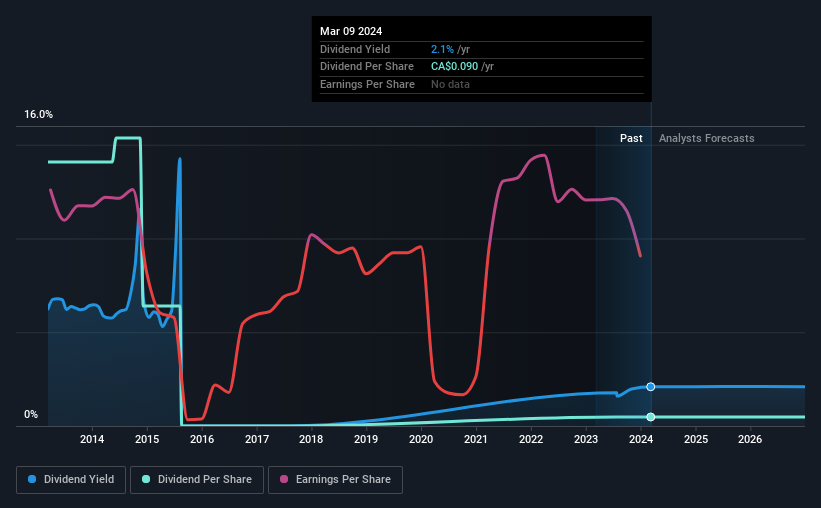Is It Worth Considering Baytex Energy Corp. (TSE:BTE) For Its Upcoming Dividend?
Readers hoping to buy Baytex Energy Corp. (TSE:BTE) for its dividend will need to make their move shortly, as the stock is about to trade ex-dividend. Typically, the ex-dividend date is one business day before the record date which is the date on which a company determines the shareholders eligible to receive a dividend. The ex-dividend date is of consequence because whenever a stock is bought or sold, the trade takes at least two business day to settle. This means that investors who purchase Baytex Energy's shares on or after the 14th of March will not receive the dividend, which will be paid on the 1st of April.
The company's next dividend payment will be CA$0.0225 per share, and in the last 12 months, the company paid a total of CA$0.09 per share. Based on the last year's worth of payments, Baytex Energy has a trailing yield of 2.1% on the current stock price of CA$4.30. We love seeing companies pay a dividend, but it's also important to be sure that laying the golden eggs isn't going to kill our golden goose! So we need to investigate whether Baytex Energy can afford its dividend, and if the dividend could grow.
Check out our latest analysis for Baytex Energy
Dividends are usually paid out of company profits, so if a company pays out more than it earned then its dividend is usually at greater risk of being cut. Baytex Energy reported a loss after tax last year, which means it's paying a dividend despite being unprofitable. While this might be a one-off event, this is unlikely to be sustainable in the long term. Considering the lack of profitability, we also need to check if the company generated enough cash flow to cover the dividend payment. If cash earnings don't cover the dividend, the company would have to pay dividends out of cash in the bank, or by borrowing money, neither of which is long-term sustainable. What's good is that dividends were well covered by free cash flow, with the company paying out 16% of its cash flow last year.
Click here to see the company's payout ratio, plus analyst estimates of its future dividends.
Have Earnings And Dividends Been Growing?
Stocks in companies that generate sustainable earnings growth often make the best dividend prospects, as it is easier to lift the dividend when earnings are rising. If earnings fall far enough, the company could be forced to cut its dividend. Baytex Energy reported a loss last year, but at least the general trend suggests its income has been improving over the past five years. Even so, an unprofitable company whose business does not quickly recover is usually not a good candidate for dividend investors.
The main way most investors will assess a company's dividend prospects is by checking the historical rate of dividend growth. Baytex Energy's dividend payments per share have declined at 29% per year on average over the past 10 years, which is uninspiring.
We update our analysis on Baytex Energy every 24 hours, so you can always get the latest insights on its financial health, here.
Final Takeaway
Should investors buy Baytex Energy for the upcoming dividend? It's hard to get used to Baytex Energy paying a dividend despite reporting a loss over the past year. At least the dividend was covered by free cash flow, however. In summary, while it has some positive characteristics, we're not inclined to race out and buy Baytex Energy today.
So while Baytex Energy looks good from a dividend perspective, it's always worthwhile being up to date with the risks involved in this stock. To that end, you should learn about the 2 warning signs we've spotted with Baytex Energy (including 1 which shouldn't be ignored).
If you're in the market for strong dividend payers, we recommend checking our selection of top dividend stocks.
Have feedback on this article? Concerned about the content? Get in touch with us directly. Alternatively, email editorial-team (at) simplywallst.com.
This article by Simply Wall St is general in nature. We provide commentary based on historical data and analyst forecasts only using an unbiased methodology and our articles are not intended to be financial advice. It does not constitute a recommendation to buy or sell any stock, and does not take account of your objectives, or your financial situation. We aim to bring you long-term focused analysis driven by fundamental data. Note that our analysis may not factor in the latest price-sensitive company announcements or qualitative material. Simply Wall St has no position in any stocks mentioned.

